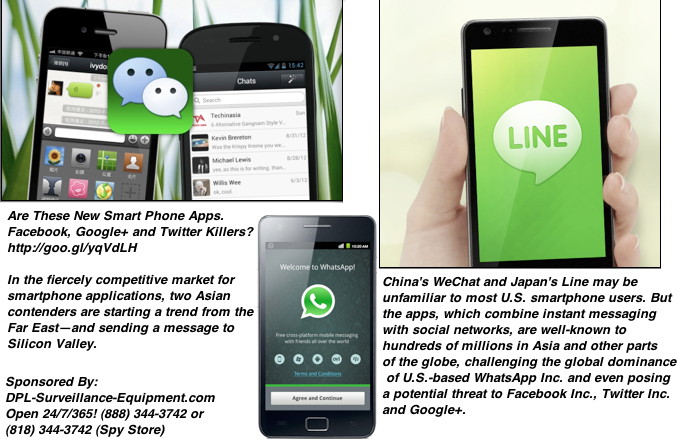Facebook To Banks: Give Us Your Data, We’ll Give You Our Users (#GotBitcoin?)
Facebook has asked large U.S. banks to share detailed financial information about customers as it seeks to boost user engagement. Facebook To Banks: Give Us Your Data, We’ll Give You Our Users
Facebook Inc. Wants Your Financial Data
The social-media giant has asked large U.S. banks to share detailed financial information about their customers, including card transactions and checking-account balances, as part of an effort to offer new services to users.

Facebook increasingly wants to be a platform where people buy and sell goods and services, besides connecting with friends. The company over the past year asked JPMorgan Chase & Co., Wells Fargo & Co., Citigroup Inc. and U.S. Bancorp to discuss potential offerings it could host for bank customers on Facebook Messenger, said people familiar with the matter.
Facebook has talked about a feature that would show its users their checking-account balances, the people said. It has also pitched fraud alerts, some of the people said.
Data privacy is a sticking point in the banks’ conversations with Facebook, according to people familiar with the matter. The talks are taking place as Facebook faces several investigations over its ties to political analytics firm Cambridge Analytica, which accessed data on as many 87 million Facebook users without their consent.
One large U.S. bank pulled away from talks due to privacy concerns, some of the people said.
Facebook has told banks that the additional customer information could be used to offer services that might entice users to spend more time on Messenger, a person familiar with the discussions said. The company is trying to deepen user engagement: Investors shaved more than $120 billion from its market value in one day last month after it said its growth is starting to slow.
Facebook said it wouldn’t use the bank data for ad-targeting purposes or share it with third parties.
“We don’t use purchase data from banks or credit card companies for ads,” said spokeswoman Elisabeth Diana. “We also don’t have special relationships, partnerships, or contracts with banks or credit-card companies to use their customers’ purchase data for ads.”
Facebook shares climbed sharply on the news, up 3.5% around midday, marking the biggest gain since last month’s historic drop.
Banks face pressure to build relationships with big online platforms, which reach billions of users and drive a growing share of commerce. They also are trying to reach more users digitally. Many struggle to gain traction in mobile payments.

Yet banks are hesitant to hand too much control to third-party platforms such as Facebook. They prefer to keep customers on their own websites and apps.
As part of the proposed deals, Facebook asked banks for information about where its users are shopping with their debit and credit cards outside of purchases they make using Facebook Messenger, the people said. Messenger has some 1.3 billion monthly active users, Chief Operating Officer Sheryl Sandberg said on the company’s second-quarter earnings call last month.
Alphabet Inc.’s Google and Amazon.com Inc. also have asked banks to share data if they join with them, in order to provide basic banking services on applications such as Google Assistant and Alexa, according to people familiar with the conversations.

“Like many online companies, we routinely talk to financial institutions about how we can improve people’s commerce experiences, like enabling better customer service,” Ms. Diana said. “An essential part of these efforts is keeping people’s information safe and secure.”
Facebook has taken a harder public line on privacy since the Cambridge Analytica uproar. A product privacy team has announced new features such as “clear history,” which would allow users to prevent the service from collecting their off-Facebook browsing details. It also is making efforts to alert users to its privacy settings.
That hasn’t assuaged concerns about Facebook’s privacy practices. Bank executives are worried about the breadth of information being sought, even if it means not being available on certain platforms that their customers use. Bank customers would need to opt-in to the proposed Facebook services, the company said in a statement Monday.
JPMorgan isn’t “sharing our customers’ off-platform transaction data with these platforms, and have had to say no to some things as a result,” said spokeswoman Trish Wexler.
Banks view mobile commerce as one of their biggest opportunities, but are still running behind technology firms such as PayPal Holdings Inc. and Square Inc. Customers have moved slowly, too; many Americans still prefer using their cards, along with cash and checks.

In an effort to compete with PayPal’s Venmo, a group of large banks last year connected their smartphone apps to money-transfer network Zelle. Results are mixed so far: While usage has risen, many banks still aren’t on the platform.
In recent years, Facebook has tried to transform Messenger into a hub for customer service and commerce, in keeping with a broader trend among mobile messaging services.
A partnership with American Express Co. allows Facebook users to contact the card company’s representatives. Last year, Facebook struck a deal with PayPal that allows users to send money through Messenger. Mastercard Inc. cardholders can place online orders with certain merchants through Messenger using the card company’s Masterpass digital wallet. (A Mastercard spokesman said Facebook doesn’t see card information.)
Facebook And Financial Firms Tussled For Years Over Access To User Data
The social network’s negotiating stance with institutions has evolved.
Facebook Inc. had been haggling with financial firms over its access to users’ sensitive financial information for years, well before the social-media company came under fire for its handling of personal data.
As recently as last year, the social-media company pressed financial firms for the ability to use customer data flowing through its Messenger platform for a range of purposes, including advertising, according to people familiar with the matter and documents reviewed by journalist. Concerned about privacy, several firms negotiated bespoke agreements that limited how Facebook could use any financial information that would pass through its servers.
The negotiations highlight a dilemma facing Facebook as it balances its need for detailed user data to better target advertisements and increase user engagement with concerns about how best to handle users’ most sensitive personal information. It is an issue that has taken on new importance following the uproar over Facebook’s ties to political analytics firm Cambridge Analytica, which accessed information on as many as 87 million users of the social-media network without their consent.
Facebook has in recent months taken steps to give users more control over the massive cache of data it collects. Earlier this year, the company changed its privacy policy to more clearly spell out how it handles advertising and user data. In April, before the European Union began enforcing its General Data Protection Regulation privacy law, Facebook asked users to review information about different types of advertising.
“Like many online companies, we partner with financial institutions to improve people’s commerce experiences, like enabling better customer service, and people opt into these experiences,” said Facebook spokeswoman Elisabeth Diana. “We’ve emphasized to partners that keeping people’s information safe and secure is critical to these efforts. That has been and always will be our priority.”
She said Facebook hasn’t and doesn’t use consumer financial data for so-called ad targeting, or placing ads in front of specific audiences.
Facebook’s negotiating stance with financial firms evolved over the years, ranging from asserting ownership of all data that passes through its servers to, later on, allowing financial firms to restrict its use of the information. Several of the deals were negotiated ahead of Facebook’s 2017 developer conference, when more than a dozen companies in multiple industries, including financial services, launched services on Messenger.
Prior to the launch, Facebook’s privacy policy said “we use all of the information we have about you to show you relevant ads.”
In conversations with American Express Co. in 2016, Facebook executives said they wanted to use individualized cardholder spending data that passes through Facebook for a variety of purposes, according to a person familiar with the matter. That would have allowed them to use the data for ad targeting, the person said.
The companies were discussing launching an AmEx chatbot on Facebook that would send transaction-level alerts to AmEx U.S. cardholders who sign up for the service. Those alerts function like purchase receipts that tell cardholders when their AmEx card has been used to make a purchase.
AmEx didn’t want Facebook to use individualized data for anything besides servicing cardholders who opted into the chatbot, the person said, and instead agreed to provide aggregated transaction data for ads and other purposes.
After Bank of America Corp. reviewed Facebook’s terms, it decided it would move its clients who engage in private messaging with the bank on Facebook off of the site so that Facebook wouldn’t gain access to their financial data, according to a person familiar with the matter.
When Wells Fargo & Co. launched a chatbot pilot with Facebook in 2017, it informed customers that Facebook would have access to their Messenger conversations with bank representatives, per its data policy. “Customers were cautioned that they should not enter account numbers or other sensitive data in their chatbot conversations,” a spokeswoman said. The 5,000-customer pilot ended in April.
PayPal Holdings Inc., which allows users of the payment service to send money through Messenger, negotiated a custom contract that prohibits Facebook from using PayPal customers’ data for advertising or any of Facebook’s own commercial purposes, the company said.
Western Union Co. , which also launched a Messenger-based money-transfer service at the 2017 developer conference, has a custom deal that “reflects our privacy obligations to our customers,” said spokeswoman Pia De Lima.
The deals predate a more recent Facebook effort reported last month to form partnerships with big banks to offer a range of customer services through Messenger, including fraud alerts and a feature that would show its users their checking-account balances. The company said it wouldn’t use any information obtained through those services for ad-targeting purposes.
Banks have been hesitant to give too much control to Facebook. At least one large U.S. bank pulled away from the Facebook talks because of privacy concerns, according to the earlier Journal report.
Why China Leads the World in Mobile Payments
As consumers, it is clear that mobile devices are a mainstay in our daily social lives- from connecting with friends over social media, making dinner reservations, or researching and sharing product recommendations or reviews online. Now, it is the explosive growth of mobile payments that is transforming our financial lives- and China is leading the way! With a record $12.8 trillion in mobile payment transactions from January – October 2017, China far surpasses the U.S. at only $49.3 billion. But why?
Chinese Consumers Embrace Mobile Payments
Unlike the U.S. market where consumers have been hesitant to abandon their credit and debit cards, Chinese consumers are adopting cashless and e-commerce methods at a faster rate than the rest of the world. They have been fast adopters of online retail, financial and on-demand services and prefer the convenience of mobile payments to do it.
In 2016, China had 731 million Internet users- more than the European Union and the United States combined! Nearly one in five Internet users (20%) in China relies on mobile only, compared with just 5% in the United States. The share of Internet users in China making mobile digital payments is around 68%, compared with only around 15% in the United States.
Whereas U.S consumers are concerned about mobile security and even many merchants seem confused about accepting mobile wallets, China’s e-commerce market is driven by its mobile-first consumer behavior. According to a PWC report 31% of Chinese consumers will click on an ad that is relevant to them versus 16% globally. Chinese people appreciate the convenience and ease of payment that come with mobile wallets more than Americans do.
China’s Digital Infrastructure Supports Mobile Payments
China is now the largest e-commerce market in the world. It accounts for more than 40% of the value of worldwide e-commerce transactions, up from less than 1% about a decade ago. China has also become a major global force in mobile payments with 11 times the transaction value of the United States.
The Chinese government is playing an active role in building a world-class infrastructure to support digitization as an investor, developer, and consumer. China is being transformed into a world digital leader according to the McKinsey Global Institute.
Led by the popular mobile apps, AliPay and WeChat Pay, Chinese consumers go straight from cash to smartphones, skipping the use of credit and debit cards. Run by two of the world’s most valuable companies, Alibaba Group Holding, Ltd and Tencent Holdings, Ltd respectively, money in China flows through a digital system that combines social media, commerce, and banking.
In contrast, the United States depends on banks for most non-cash payments, and all are tied to consumer bank accounts. With multiple firms involved in the process, from banks to credit card companies to payment processors, the cost of transactions goes up with their handling and processing fees. Wallets and payments systems like PayPal, Apple Pay, and Google Pay are also connected to this system, but neither commands the market that AliPay and WeChat Pay do in China. As a result, U.S. merchants lose substantial amounts of money to these fees on purchases made with cards or mobile payments in the U.S.
If third party apps were to take hold in the U.S. at the same rate as in China, banks stand to lose $43 billion dollars. It’s no wonder, Bloomberg reported “China’s Payment Apps Give U.S. Bankers Nightmares.”
U.S. Mobile Payments Opportunity

The U.S. received some 2.6 million Chinese visitors in 2015, according to National Travel and Tourism Office. The number is expected to reach 6 million by 2021, according to the US Travel Association. Chinese tourists and students in the U.S. represent a significant market opportunity for China’s major mobile payment apps.
It is estimated that 61% of global mobile payments users this year will be from China, according to eMarketer; with AliPay and WeChat Pay having 520 million and 1 billion monthly users, respectively. Mobile payment accounts for about 41% of all transactions abroad. Nielsen found that over 90% Chinese tourists would use mobile payment overseas given the option and that if overseas merchants supported the use of Chinese mobile payment brands, it would further increase their desire to shop. This, along with the significant growth in per capita income of residents in China and the increasing number of Chinese citizens traveling overseas makes accepting China’s mobile payments smart business for U.S. merchants.
AliPay Targets U.S. Market

Alipay entered the U.S. market in 2016. They announced a deal on May 8, 2018 with Atlanta-based payments processor First Data under which more than 4 million US merchants will accept payment via the service. That puts AliPay in the same league as Apple Pay, which is at 4.5 million. However, the primary target is not Americans. It’s the growing number of Chinese tourists and students in the US.
AliPay also recently partnered with FreedomPay, a global leader in protected commerce technology and a keynote speaker at this year’s Mobile Payments Conference 2018. The partnership will provide Alipay with new customers focusing on the travel and hospitality sector and an ability to capitalize on Chinese tourists. Meanwhile, China’s other mobile wallet giant — Tencent’s WeChat Pay — will fight Alipay furiously for the American market.
Go back
Leave a Reply
You must be logged in to post a comment.